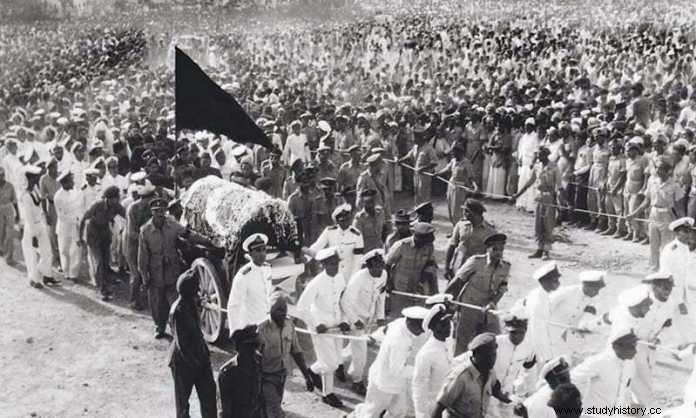
Jinnah considered Pakistan as his creation and behaved like an autocratic ruler, so soon after the formation of Pakistan, Jinnah's companions started ignoring Jinnah. Pakistani journalist Jamar Niazi published his book 'Press in Chains' It is written in- 'Jinnah was completely disillusioned with the Pakistan he had created. Liaquat Ali Khan started ignoring Jinnah's instructions. All this provoked Jinnah to rebuke Liaquat Ali Khan without talking and he (Jinnah) also said in despair that he (Jinnah) would like to go back and ask Nehru to forget the past and get back together. Jinnah's physician who was a witness to the incident has corroborated this statement. It was a few days before the sad end of the ailing Jinnah.'
On 30 October 1947, Jinnah said in Lahore- 'Some may certainly think that the adoption of the plan of 3 June was a mistake of the Muslim League. Jinnah blamed the forces for the disorder that instigated the death of lakhs of people and the destruction of vast property during the partition of India. In the end, explaining the deaths, Jinnah said- 'Our religion teaches us that we should always be ready for death. There is no better salvation for Muslims than the death of a martyr for a religious cause.'
Jinnah's daughter rejected Pakistan
Dina Wadia, the daughter of Muhammad Ali Jinnah, did not go to Pakistan after the Indo-Pak partition with her father who was the Governor General of Pakistan. She married Neville Wadia, an Indian Parsi youth in AD 1938. Therefore, she remained in India with her husband and continued to live in the city of Bombay in India as an ordinary citizen till her death. He had nothing to do with his father's Pakistan.
Jinnah's illness
Jinnah used to have lung infection and cough from AD 1941. He used to smoke cigarettes a lot. Due to this he had contracted tuberculosis and his life was not saved much, but he hid his illness in such a way that no one knew about it except his personal doctor. His illness worsened only a few days after the formation of Pakistan.
Jinnah's death
When Jinnah's health started deteriorating, on 14 July 1948, he was taken to a place called Ziyarat in Balochistan for health benefits. There too, when his health did not recover, he was taken to Quetta on 13 August 1948. From 5 September his condition started deteriorating further and on 11 September he was brought from Quetta to Karachi by special aircraft of the Governor General. From where he was taken in an ambulance to his native residence. Jinnah died in the night on 11 September 1948. Thus it was not even thirteen months since Pakistan was formed that Jinnah died on 11 September 1948. It was as if he had come to this earth only to create Pakistan. Work is over, life is over.
Ignoring Muhammad Ali by Liaquat Ali
Jinnah's sister Fatima Jinnah in her book 'My Brother' It is written in- 'When Jinnah reached the ailing Karachi airport, no one was there to welcome him. …… This happened on the instructions of Liaquat Ali. Jinnah lay helpless on the road for more than two hours as the ambulance broke down on the way.'
All these were signs of a deep rift between Jinnah and Liaquat Ali. Sriprakash, the then High Commissioner of India appointed to Pakistan, has written- 'Actually Jinnah had died in Quetta itself. No one, including Prime Minister Liaquat Ali, was informed about Jinnah's death till midnight even after Jinnah's body reached his ancestral residence in Karachi.'
If Jinnah had died two years earlier
Many writers have raised the point that if the Indian leaders had come to know about this, instead of hurriedly making India's independence, they would have sat peacefully for a few days and waited for Jinnah's death and at the same time there was a threat of partition of India forever. Gets away Mountbatten himself admitted this in an interview with Larry Collins and Dominique Lapierre. He said- 'If Jinnah had died of his illness two years ago, we could have kept India one. He was the one who made it (India's integrity) impossible. Until I met Jinnah, I could not imagine how impossible the situation was.'
